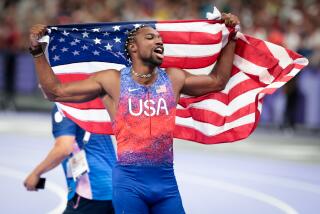No Silver Whining
- Share via
SALT LAKE CITY — Apolo Anton Ohno, the 19-year-old from Seattle bidding to win four medals in short-track speedskating, was denied gold Saturday night in the first of his four scheduled events, the 1,000 meters, finishing second after a spectacular crash wiped out all but one skater in the final turn.
Steven Bradbury of Australia, who had been far back, was the only racer not involved in the pile-up. While the others tried to pick themselves up, Bradbury--who would have finished fifth were it not for the spill--cruised across the finish line to unexpectedly win gold in 1 minute 29.109 seconds.
Heading into the last turn of the last lap, Ohno had been leading the pack. But China’s Li Jiajun went down, sending South Korea’s Ahn Hyun Soo into Ohno. Canada’s Mathieu Turcotte also skidded out.
The crowd’s deafening shouts of “U-S-A! U-S-A!” turned to boos and a roar of disbelief as Bradbury glided across first, still standing, for Australia’s first gold medal in Winter Games history.
Ohno scrambled up and threw himself across the line for the silver medal in 1:30.160. Turcotte limped in third in 1:30.563.
The crash left Ohno with six stitches on the inside of his left leg, near his knee, and Turcotte with a painful slice on his backside.
Ohno arrived at a news conference afterward on crutches and departed in a wheelchair but said, “I’m OK,” and added that he expected to be ready for his next races Wednesday.
Ohno said he’d never been involved in such a whopper of a crash, calling it “definitely unfortunate.” But he said he was happy with silver--”my quest, my journey, was not about four golds”--and added, “This is short-track. This is the sport I live for.”
Bradbury, meantime, a 28-year-old from Brisbane who runs a boot-making company--the firm makes Ohno’s skates--seemed dazed at his good fortune, which will provide a huge boost for Australia’s burgeoning Olympic winter sports program. Crossing the finish line, he said afterward, “I was like, ‘Hang on, this can’t be right. I think I won.’”
On Friday night, Bradbury said, he had sent Ohno an e-mail asking for a mention of his company if Ohno won a medal. A survivor who recovered from a broken neck in September 2000, as well as a 1994 short-track crash that gave him 111 stitches, he said that winning Olympic gold was a “surreal feeling.”
In other racing Saturday at the Salt Lake Ice Center, Yang Yang (A) of China, the overall gold medalist at the last five world championships, dominated the women’s 500, winning in 44.187 seconds. The gold is China’s first in the Winter Games as well. “It’s been our dream for the past two generations,” she said afterward.
Evgenia Radanova of Bulgaria took silver, China’s Wang Chunlu bronze. Caroline Hallisey, 21, of Natick, Mass., finished fifth; Amy Peterson, who carried the U.S. flag into Rice-Eccles Stadium during the opening ceremony, was eliminated in the quarterfinals.
Two Chinese short-track skaters in these Games are named Yang Yang. To tell them apart, officials call one Yang Yang (A) and the other Yang Yang (S). Yang Yang (A) was born in August, thus the A; Yang Yang (S) was born in September.
A slew of Olympic records were set Saturday night.
The women’s 500-meter mark was broken three times. Beginning the night, it stood at 44.991, set at the 1998 Nagano Games by Isabelle Charest of Canada. By the end, Yang Yang (A) held the mark, at 44.118, set in the semifinals.
In the men’s 1,000 quarterfinals, Turcotte lowered the mark--set Wednesday by Rusty Smith of Sunset Beach--from 1:28.183 to 1:27.185.
Also, in qualifying for the women’s 3,000-meter relay, South Korea lowered its record to 4:14.977 from 4:16.260. The record in the 27-lap event had been set in Nagano. The U.S. team was slowed by Hallisey’s fall and failed to make Wednesday’s finals.
No American man has won a short-track gold medal since it became an Olympic sport, in 1992.
Ohno, however, has long been expected to become one of the biggest stars of the U.S. team, a medal contender in all four of his events--the 1,000 meters, 500 meters, 1,500 meters and 5,000-meter relay.
He was, for instance, the Sports Illustrated Winter Games preview edition cover guy--resplendent in his skin-tight racing suit, sporting a bristly soul patch under his lip.
But he has also endured controversy--the most recent episode stemming from allegations by another skater that he conspired to fix a race at the national trials so a close friend would also make the Olympic team.
An arbitrator ruled there wasn’t evidence to support the claim, and his accuser withdrew the complaint.
“That’s more than a million miles behind us,” Ohno had said Wednesday, after Olympic racing had begun.
The record he had set Wednesday did Smith little good Saturday. In the quarterfinals--four groups of four racers--Smith was paired with Mark McNee of Australia, Li of China (the Nagano 1,000 silver medalist) and South Korea’s Kim Dong Sung (the Nagano 1,000 gold medalist).
The top two skaters in each heat advanced. Kim and Li got through. Smith finished third. McNee slipped and fell.
By comparison, Ohno had a relatively easy draw.
Kim, Li and Turcotte were all in the other semifinal. All three fell. Turcotte, however, was put through to the final with judges ruling that his fall was someone else’s fault.
In Ohno’s semifinal bracket, he cruised to an easy win, 1:27.48.
And in the finals, he appeared headed for gold--until the final turn. Ohno said he recalled feeling the breeze in his fingers as he sailed around the corner, then, “the next thing I knew I was in the boards.”
A moment later, he said, “Maybe next time I’ll be a little bit farther in front.”
More to Read
Go beyond the scoreboard
Get the latest on L.A.'s teams in the daily Sports Report newsletter.
You may occasionally receive promotional content from the Los Angeles Times.






